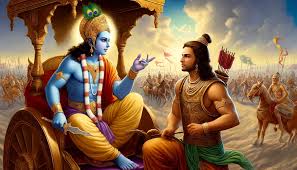In Hindu philosophy, the concepts of duty (dharma), respect for parents, and the pursuit of moksha (liberation) are intertwined. The situation you described can be addressed using shlokas from the Bhagavad Gita and the Upanishads that emphasize the importance of genuine righteousness and the futility of mere ritualistic adherence to tradition without proper ethical conduct.

Bhagavad Gita
- Respect for Parents and Elders (Pitru Devo Bhava)
अनन्याश्चिन्तयन्तो मां ये जनाः पर्युपासते |
तेषां नित्याभियुक्तानां योगक्षेमं वहाम्यहम् ||
- Bhagavad Gita 9.22:Copy code
अनन्याश्चिन्तयन्तो मां ये जनाः पर्युपासते | तेषां नित्याभियुक्तानां योगक्षेमं वहाम्यहम् ||“To those who are constantly devoted and who worship Me with love, I give the understanding by which they can come to Me.”
- Bhagavad Gita 9.22:Copy code
- Importance of Dharma (Duty)
श्रेयान्स्वधर्मो विगुणः परधर्मात्स्वनुष्ठितात् |
स्वधर्मे निधनं श्रेयः परधर्मो भयावहः ||
- Bhagavad Gita 3.35:Copy code
श्रेयान्स्वधर्मो विगुणः परधर्मात्स्वनुष्ठितात् | स्वधर्मे निधनं श्रेयः परधर्मो भयावहः ||“It is far better to perform one’s prescribed duties, even though they may be faultily, than to perform another’s duties perfectly. Destruction in the course of performing one’s own duty is better; performing the duty of another is fraught with fear.”
- Bhagavad Gita 3.35:Copy code
Upanishads

- True Knowledge and Liberation
नायमात्मा प्रवचनेन लभ्यो न मेधया न बहुना श्रुतेन |
यमेवैष वृणुते तेन लभ्यः तस्यैष आत्मा विवृणुते तनूं स्वाम् ||
- Katha Upanishad 1.2.23:Copy code
नायमात्मा प्रवचनेन लभ्यो न मेधया न बहुना श्रुतेन | यमेवैष वृणुते तेन लभ्यः तस्यैष आत्मा विवृणुते तनूं स्वाम् ||“This Self cannot be attained by instruction, nor by intellect, nor by much learning. He is to be attained only by the one whom He chooses. To such a one, the Self reveals His own form.”
- Katha Upanishad 1.2.23:Copy code
- Conduct and Liberation
अथ यदतः परं विद्यासाधनं तस्य तदुपविश्योपासीत
तदु प्रेयः स्यादमृतः स्याद्भीत्योः परं वाक्यामिति चेदमेतच्छ्रेयः |
- Chandogya Upanishad 7.26.2:Copy code
अथ यदतः परं विद्यासाधनं तस्य तदुपविश्योपासीत तदु प्रेयः स्यादमृतः स्याद्भीत्योः परं वाक्यामिति चेदमेतच्छ्रेयः |“Therefore, one should cultivate knowledge. It is knowledge that leads to immortality. By acquiring knowledge, one transcends all fears and attains the highest bliss.”
- Chandogya Upanishad 7.26.2:Copy code
Conclusion
The Bhagavad Gita and the Upanishads teach that genuine spirituality involves ethical conduct, fulfilling one’s duties, and seeking true knowledge. Mere ritualistic adherence to tradition without respect and proper behavior, especially towards parents, is insufficient for achieving moksha. True liberation comes from a sincere and righteous life, respecting the natural order of duties, including honoring one’s parents.
